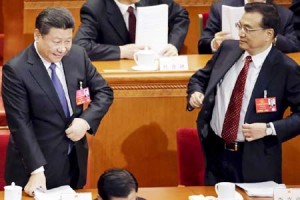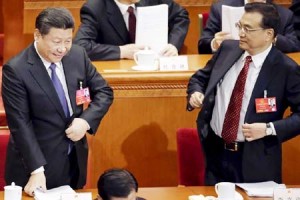Asia Times
Ding Ding
 A key feature of China’s recent draft of its 13th Five-Year Plan is that it devotes a whole chapter to “Building A National Security System.”
A key feature of China’s recent draft of its 13th Five-Year Plan is that it devotes a whole chapter to “Building A National Security System.”
The plan, released on March 5 during the current session of the National People’s Congress, dissects the meaning of what’s referred to as the “Concept of General National Security” for the first time. Before that, despite government propaganda efforts, we knew nothing about how the concept was officially interpreted, except that the country’s National Security Committee (NSC) was working on the project under President Xi Jinping’s direction.
Many nations seek to codify their approaches to national security under a single concept. But China’s definition of the idea is unique in that it’s all-inclusive. It covers almost every aspect of Chinese life including politics, the military, economy, culture, society, technology, information, resources and nuclear security. What area receives the greatest priority under the government’s latest concept of national security?
The NSC’s draft has made clear that subduing “subversion” and “sabotage” attempts by so-called hostile forces comes first. This has priority over cracking down on violent terrorist activities, separatist forces, and religious extremism.
‘Domestic’ threats get priority
Apparently, the government’s perception of domestic subversion has increased vs. traditional national security threats such as those posed by separatists in places such as Tibet and Xinjiang.
The government’s national security apparatus is also in flux. This is particularly true with respect to which agencies it relies on to safeguard the nation.
The Ministry of State Security has traditionally been China’s chief national security organ. It has created national security teams at different levels of the Chinese government to address various areas.
During the Jiang Zemin era, Beijing borrowed the idea of creating a US-style National Security Council. It created a cabinet-level unit called the National Security Leading Team in 2000.
The team was led by then-president Jiang and largely focused on foreign affairs. Later on, Beijing began to stress “incorporating domestic and international situations” as part of the body’s mandate.
After Xi came to power, the need for centralizing power and maintaining stability came to the fore. Xi’s NSC claims to be an offspring of Jiang’s National Security Leading Team to increase its legitimacy. But they are two different agencies.
Xi’s NSC has been criticized for changing the Chinese Communist Party’s (CCP) traditional notion of separating the party from state agencies. By establishing a new agency to administer everything related to security, the CCP has greatly centralized power and taken the reins from the Ministry of State Security.
In one party plenary session, the NSC has seized all decision-making power regarding security issues. It is held accountable only to the party’s politburo and its standing committee. The degree of centralized power in the NSC even exceeds that of China’s Central Military Commission, which is the state organ of the People’s Liberation Army.
How powerful will NSC become?
The big question is to what degree will the NSC continue to amplify its power and size?
Until March 2016, the list of units under the CCP’s Central Committee hasn’t included the NSC. However, the former National Security Leading Team remained on the list.
Though the NSC is said to have the advantage of cutting government red tape and improving decision-making efficiency, there are questions about its scope. Critics say it’s hard to discern what kind of national security issues should be dealt with at the NSC level and what should be left to existing agencies. Another issue is how the NSC will coordinate its activities with other state and party organs. All this represents an extremely complicated issue.We can see from the draft of the latest five-year plan that the party will have a hand in all important national security areas by establishing a security coordinating mechanism. This means NSC will become an important and far-reaching “mini government,” similar to the role played by the party’s Central Leading Group for Comprehensively Deepening Reforms. The NSC is also going a step further by taking power away from the Politburo and the State Council in order to strengthen one-man rule. But the people who will be implementing the NSC’s decisions are still the same cadres and localities that were in place previously. Whether efficiency will be improved remains to be seen.
At the same, as NSC rises, the old system of domestic security run by agencies such as the Ministry of Public Security and the Ministry of State Security, may be severely challenged.
The Domestic Security Protection Bureau of the Ministry of Public Security, for example, is rumored to be abolished. Its functions, including collecting information, building secret services, detecting political dissents, controlling ethnic and religious groups and cracking down on “evil organizations,” will supposedly be divided among other bureaus.
The Ministry of State Security, moreover, is sure to lose its monopoly over state security. This is because the five-year plan draft stresses coordination in different national security arenas within China’s national security system.
Under pressure to perform in the face of competitors like the NSC, the ministry has reported more espionage cases over the past 2 years. But a lot of cases resulted from over-classifying or over-zealousness.
Such ministerial interests aside, the surge in suspected espionage cases is also due to Beijing’s need to fuel nationalism against foreign forces and strengthen social control.
Since the Chinese public has no way to control such party and government moves, the responsible agencies can choose what information to disclose and what to withhold, making it easy to prosecute and increase the number of such espionage cases.
Regressing to past security practices
There’s also been a rise in the surveillance of Chinese citizens and interference with personal freedoms by Beijing’s various legislatures in recent years. Such acts have been carried out in the name of social stability and security. The 9th Amendment to the Criminal Law passed in September 2015, added 20 crimes regarding information security. They include crimes like “Fabricating false reports of danger, epidemic, disasters or security alerts and transmitting them through information networks or other media.”
All factors considered, recent party steps to extend the concept of national security reflects more than adaptating to changes in China’s domestic and international situations. Nor are such moves simply tools in the struggle for power and governance inside the country. It’s an indication of Beijing’s anxiety. The draft of the 13th Five-Year Plan shows that in times of crisis, a communist country will regress to the status of a police state.



